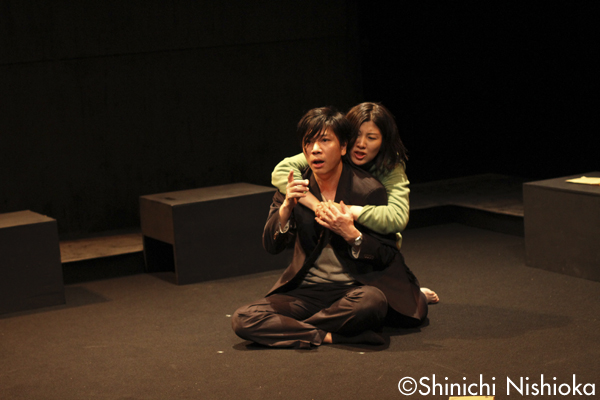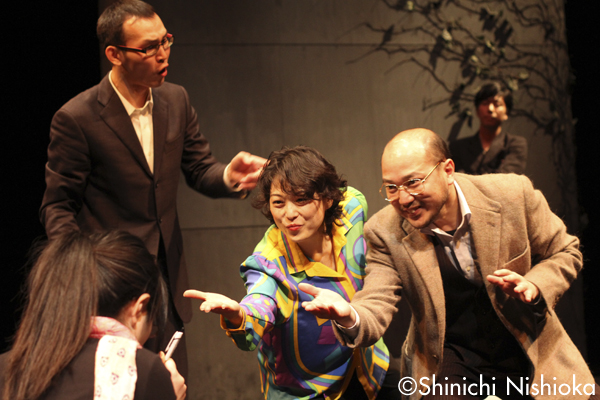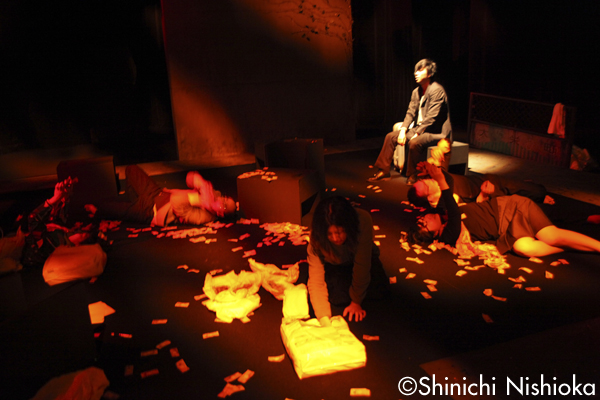In addition to their own roles, the characters also perform alternate roles in the recollection scenes, etc.
The stage lights come on and the play begins with a seated Yukichi dropping his folded arms.
It is night. In a train bound for Daiei-cho, Yukichi is recalling memories of his childhood.
Among his recollections is the way he used to play as a child by pulling out the drawers of the chest to form a set of steps he could climb up and jump off. But, one time he fell badly and broke his arm. The bone eventually set with a crook in it, and he recalls feeling that his mother looked on him differently after that.
Few people get off the train at the Kannon Station that is his destination, and the hotel that an old woman directs him too has already gone out of business and is being used as the office of a candidate running for the town council.
The woman running the café bar he has entered to get something to eat asks him if he isn’t the Yukichi who was driven out of town on suspicion of having set a fire.
He hurries out of the café and after spending the night in the waiting room of the station a young man approaches to speak to him. He is the boyfriend of the café matron’s daughter and he has heard the rumors about Yukichi. He says that he was laid off at the factory where he worked on contract as a temporary worker and now he is in training in agricultural work.
After parting ways with the young man, Yukichi goes to visit his girlfriend from high school, Iori. He finds that she is married now and expecting a child. Iori’s father Kozo Furuta, who used to be an influential figure in the community, strutting his right wing politics, until he suffered a stroke that has left him bedridden. Yukichi used to hate him for keeping his mother as his mistress.
The meeting brings back memories of their love, when Iori would come to him saying, “Hold me,” and a mix of other recollections from Yukichi’s high school days.
When the father Kozo had heard that Yukichi and his daughter were dating, he came to find him, yelling furiously he punched Yukichi and then spread kerosene on the empty lot in front of his house and set it afire. The tall goldenrod burns furiously. The fire Yukichi was accused of starting was actually Kozo’s doing.
Yukichi throws the token gift of money for the sick at the bedridden Kozo when he visits, informs him of his mother’s death and shouts, “Apologize,” but the complaint doesn’t reach the debilitated old man. Yukichi is emotionally spent by the time he leaves the Furuta house.
Yukichi has thought of another way to pay back the people of the town who wronged him in the past.
After fleeing the town Yukichi had gotten a job as a salesman in health foods company in Osaka. Yukichi’s good record as a salesman had caught the eye of the company’s president and he had eventually been given charge of a subsidiary that sold water purifiers. That company had been run on a pyramid selling method that brought Yukichi big profits, but no amount of wealth could drive away his sense of emptiness. Unable to find understanding from his mother, he had moved out to live alone. When his mother got cancer she said she wanted to return to Daiei-cho, and after she died he had stuffed all his money in a suitcase and come back to his hometown.
His idea is to take advantage of the town’s only proud product, its rice, and sell it as a premium brand under the name “
Kannon sama no megumi mai
” (Rice of the Goddess of Mercy’s blessing) to revive the run-down town and make the people who ran his mother out of this town regret their misdeed. Using his salesman’s persuasiveness honed from years of pyramid-selling work, and his money, Yukichi gradually gets the townspeople to join in the business.
Yukichi’s business strategy is a success, and even TV news programs come to do stories about the new product. The townspeople now follow Yukichi’s every command and dance for joy with the new “prosperity” he has brought. Yukichi is now the town’s hero.
A scene at the Furuta home where Iori lives in interjected at this point in the play. She tells about the fire her father saw near the national highway. As Iori describes the raging fire, in the background we hear Yukichi’s sales talk and how the success of the risky business has not brought anything but money.
The bright, shimmering light of a fire illuminates the two as they talk and the bustling townspeople. One by one the townspeople’s activities come to an end and they disappear. The scene returns to the train headed toward Daiei-cho where Yukichi sits, and once again he drops his folded arms.





